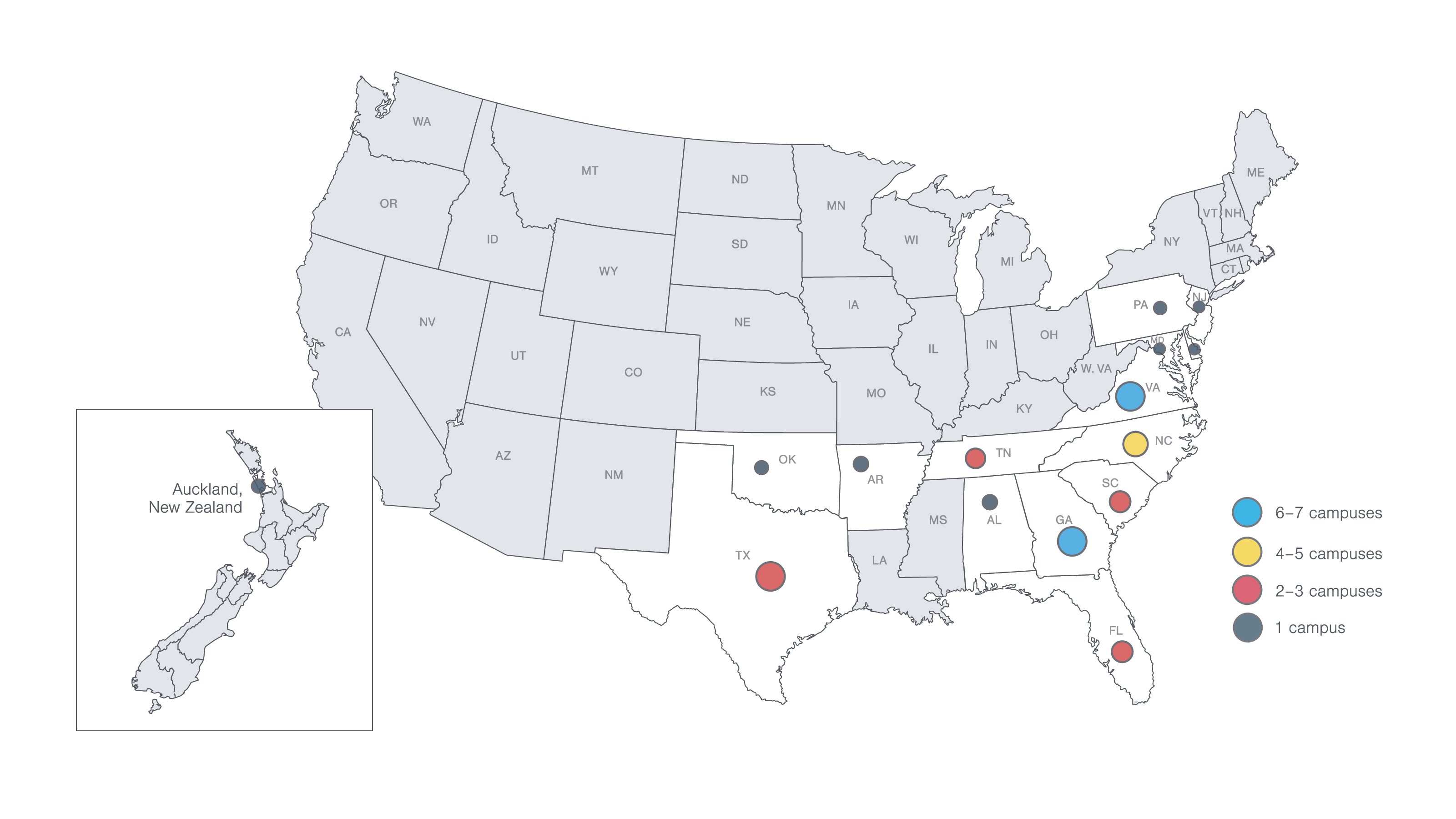Here’s a no-cost way to complete gen eds. Get details
Bachelor of Science in Health Services Administration Public Health
PROGRAM AT A GLANCE
Why earn a degree in Public Health from Strayer?
Develop the skills to help become a positive force of change in your community with this concentration. You’ll leave the program with a foundational background in biostatistics, disease prevention and more. Your impact starts here.
Foster well-being and promote community health
Public health professionals are vital for healthy and thriving communities. With a Bachelor of Science (BS) Health Services Administration, Public Health from Strayer, you’ll learn to promote well-being, address negative environmental factors and advocate for policies that protect public health and prevent disease. The professionally aligned curriculum covers the history of the field while teaching the latest skills needed to investigate disease outbreaks and craft emergency management plans.
Skills you’ll learn in a Strayer BS in Health Services Administration, Public Health concentration
- Gain an understanding about the origin of public health and early contributors in the field are explored in addition to the Ten Essentials Public Health Framework, the ten greatest achievements in public health and the role of public health professionals to promote and protect communities are presented in the course
- Learn how to conduct a disease outbreak investigation, manage epidemiological data, and interpret results
- Explore and understand the basic biostatistical principles with a focus on public health data
- Acquire a knowledge of theoretical and practical approaches for health promotion, disease prevention, and lifestyle concepts
- Introduce students to public health preparedness and emergency management
- Learn the steps for managing an emergency and how to craft emergency management plans
Earn your degree from an accredited university
Strayer University is an accredited institution and a member of the Middle States Commission on Higher Education (MSCHE or the Commission) www.msche.org. Strayer University’s accreditation status is Accreditation Reaffirmed. The Commission’s most recent action on the institution’s accreditation status on June 22, 2017 was to reaffirm accreditation. MSCHE is recognized by the U.S. Secretary of Education to conduct accreditation and pre-accreditation (candidate status) activities for institutions of higher education including distance, correspondence education, and direct assessment programs offered at those institutions. The Commission’s geographic area of accrediting activities is throughout the United States.

Bachelor of Science in Health Services Administration in Public Health cost breakdown
- 40 courses, $1555 per course
- $65 technology fee each term
- $150 one-time degree conferral fee
- $100 resource kit per course
Estimate the cost of your degree
How much does a Bachelor of Science in Health Services Administration in Public Health cost?
Estimate the cost of your degree
How much does a Bachelor of Science in Health Services Administration in Public Health cost?
Expected Graduation
...
Approximate Total
...
*Student is required to take two courses per quarter during disbursement period
PREPARING YOUR RESULTS
Time commitment
Calculate the approximate time commitment of your degree.
| Course load | ... courses/term |
| Classroom time | ... hours/week |
| Terms per year | ... terms |
| Terms to graduation | ... terms |
Cost analysis
Calculate the approximate cost of your degree
| Tuition | ... |
| Books | ... |
| Fees | ... |
| No-cost gen ed | $0 |
| Transfer credits | ... |
| Transfer Credit Scholarship | $0 |
| $4K scholarship | $0 |
| Strayer Learn and Earn Scholarship | $0 |
| Approximate total | ... |
Opportunities to save on tuition
Employer Tuition Assistance
More than 500 organizations invest in their employees by partnering with Strayer University to offer access to discounted education programs.
The Strayer Learn and Earn Scholarship
For every three courses you pass, earn one on us, tuition-free, to be redeemed at the end of your program with the Strayer Earn and Learn Scholarship. Eligibility rules and restrictions apply. Connect with us for details.
Save up to $15,250 on your bachelor’s degree
As a Strayer student, you have access to no-cost gen ed courses through our affiliate, Sophia. Take up to two online Sophia courses at a time and transfer eligible courses towards your undergraduate degree.
*Savings assumes transferring 10 courses taken at Sophia. Eligibility rules apply. Connect with us for details.
Explore courses in Strayer’s Bachelor of Science in Health Services Administration, Public Health
Discover how you can help promote healthy lifestyles, prevent the spread of disease and ensure safe environments for communities. You’ll learn to interpret data to understand public health trends and study epidemiology to help identify outbreaks of disease. You’ll also learn how to plan for and respond to public health emergencies, like natural disasters or other large-scale events.
Public Health Concentration Courses
Complete your degree from where you live, on your time, in a flexible, 100% online program. Using our online portal, you’ll be able to:
- Access lectures and coursework
- Complete assignments and exams
- Communicate with professors and classmates
- Access student resources and support
From day one, you’ll have a team of advisors and coaches to help you balance college, work and your personal life. Tap into support resources online or at a campus near you.
You’ll have access to:
- Admissions and enrollment support
- One-on-one academic coaches
- Financial guidance and potential cost savings
- Career planning services
The faculty at Strayer University bring years of real-world industry experience to the classroom, offering valuable insight and practical knowledge. They are committed to supporting your professional goals and are responsive to questions and concerns through the virtual courseroom.
What can you do with a BS HSA, Public Health degree?
Your education can help you pursue your professional and personal goals. While Strayer cannot guarantee that a graduate will secure any specific career outcome, such as a job title, promotion or salary increase, we encourage you to explore the potential impact you can have in the public health field.
Versatile skills for your future
The public health concentration provides students with a foundation in the field of public health, basic biostatistics, epidemiology, disease prevention and emergency management and preparedness.
In addition, students who complete this concentration will be prepared to:
- Create health education materials to address smoking, vaccines and other public health concerns.
- Develop and provide health education programs like workshops, conferences and community presentations.
- Collaborate with health specialists and civic groups to assess community health needs and which services are available to meet those needs.
- Develop plans and policies required to help achieve health education objectives and services.
- Conduct evaluations and studies to assess the quality and performance of health education programs.
- Support agencies and organizations in assessing health education needs and develop and provide health education programs.
- Obtain information from relevant sources and manage external communications.
- Use relevant information to determine whether events or processes comply with laws, regulations or standards.
86
of Strayer bachelor’s alumni agree that Strayer was the right choice for earning their degree.
Strayer Alumni Survey, 2022
Apply for your Public Health degree today
An admissions officer can help you choose the right program, register for classes, transfer credits and find cost-savings opportunities.
Here’s what you’ll need to get started:
Spring classes start on April 6
Learn more about Strayer University’s admissions process.
Transferring to Strayer from another university?
Your bachelor’s degree from Strayer could be 70% complete when you transfer up to 28 classes.
Strayer welcomes international students
Strayer University is proud to have hosted more than 4,000 international students from over 110 countries. Earn your degree in the U.S. or completely online in your home country – it’s your choice.


Campus locations
Come to a campus near you for guidance and support. You’ll have access to helpful resources, a supportive community and plenty of spaces to learn and grow.
Ready to take the next step?
Your admissions officer is here to guide you through every step of the process, from completing your application to choosing your concentration.